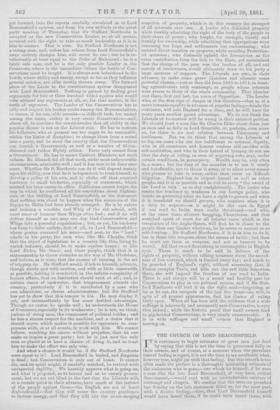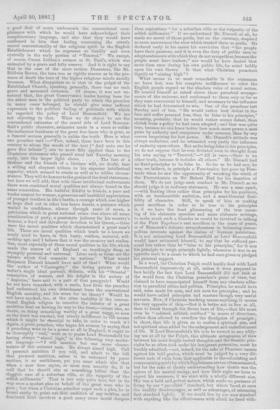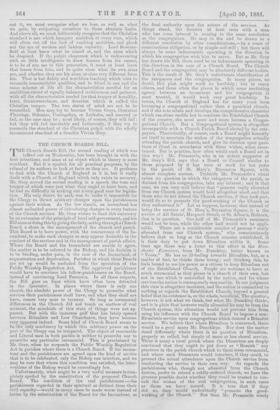THE CHURCH ON LORD BEACONSFIELD.
"TT is customary to begin estimates of great men just dead
by saying that this is not the time to pronounce fully on their careers, and of course, at a moment when the prevalent tone of feeling is regret, it is not the time to say needlessly what, however true, might jar with that feeling. But this remark is too often made the preface to a thoroughly misleading estimate of the statesman who is gone,—one which he himself, if he were a man like the late Lord Beaconsfield, of very keen, critical discernment,—would read with an uncomfortable mixture of contempt and chagrin. We confess that the sermons preached last Sunday on the late statesman filled us, for the most part, with a double feeling,—first, that Lord Beaconsfield himself would have heard them, if he could have heard them, with a good deal of scorn underneath the conventional com- plaisance with which he would have acknowledged their complimentary language, and also that they would have confirmed in him that feeling concerning the utterly unreal conventionality of the religious spirit in the English Establishment which he expresses so frankly and even cynically in the early portion of " Tancred." We except, of course, Canon Liddon's sermon at St. Paul's, which was animated by a grave and lofty reserve. And it is right to say that in the case of the more serious Dissenters, like Mr. Baldwin Brown, the tone was as rigidly sincere as in the pre- sence of death the tone of the higher religious minds usually becomes. What disappoints us is that in the pulpit of the Established Church, speaking generally, there was no such
grave and measured reticence. Of course, it was not un- natural that, the great Conservative leader having been far the ablest man in the political party to which the preacher in many cases belonged, he should give some indirect expression to the political feeling of gratitude with which he regarded the policy of Lord Beaconsfield. We are not objecting to that. What we do object to are the conventional estimates of the moral side of Lord Beacons- field's public character, estimates made in a sense as unlike the audacious frankness of the great free-lance who is gone, as a funeral sermon generally is unlike the truth. Here is what one preacher said :—"Few, indeed, there have been in this century to whom the words of the text [" And unto one he gave five talents "3 can be more fitly applied than to the illustrious statesman who passed away last Tuesday morning early, into the larger light above The foes of a lifetime and the friends of a lifetime will, no doubt, bear a willing and eloquent tribute to his supreme intellectual capacity, which seemed to create as well as to utilise circum- stances. They will do honour to the genius of the dead statesman ; but here we will add, that with these intellectual endowments there were combined moral qualities not always found in the same connection. His faithful fidelity to friends, a pure and tender respect for woman, a generous and healthful appreciation of younger intellect in life's battle, a courage which rose higher as hope died out in other less brave hearts, a patience which waited in confidence, silence through years of scorn, a patriotism which in great national crises rose above all mean consideration of party, a passionate jealousy for his country's honour, a loyal and chivalrous devotion to his Queen,—these were the moral qualities which characterised a great man's life. These are moral qualities which teach us a lesson we sorely need to learn, in this hasty, restless, material, self- seeking age, and I believe that it was the memory and realisa- tion, more especially of these moral qualities in his life, which made the sorrow of all England so touchingly deep, so strangely personal and universal. Lives such as these are the talents which God commits to nations." What would Benjamin Disraeli himself have said of that ? What would the author of " Coningsby," the loving painter of the writer's single ideal portrait, Sidonia, with his "Oriental" conception of women, and his delight in the society of " Aspasias," have said to a part of that panegyric? Would he not have remarked, with a smile, how little the preacher had understood his own detachment from the conventional English morality, and his scorn for its theory ? Would he not have mocked, too, at the utter inability of the conven- tional English religion to conceive the interior of a great ambition bent on hewing its way to the front,—intent also, no doubt, on doing something worthy of a great natir, so soon as tho front was reached, but utterly indifferent to trt moans which it might be etsential to take, in order to reach it ? Again, agreat preacher, who began his sermon by saying that if preaching wore to be a power at all in England, it ought to be thoroughly "real," went on to praise Lord Beaconsfield for having always "aimed high," in the following very moder- ate language ;—" I will mention but one more charac- teristic of this eminent man. Ho always aimed high. Call it personal ambition if you will, and admit to the full that personal ambition, unless it be redeemed by purer motives, is an earthliness, yet you must admit also that when a man does aspire, as most men secretly do, it is well that he should aim at something loftier than the sluggish ease of a suburban villa, or the vulgarity of the selfish millionaire." That is not only quite true, but in its way even a modest plea on behalf of the great man who is gone ; but when a Christian preacher urges such a plea, ho is bound surely to point out that ambition of any reckless and dominant kind involves a good many more moral dangers
than aspirations " for a suburban villa or the vulgarity of the selfish millionaire." If we understand Mr. Disraeli at all, he made no secret of these perils, but on the contrary, despised as mere narrowness the view which treated them as perils. He declared early in his career his conviction that "the people have their passions, and it is even the duty of public men to adopt sentiments with which they do not sympathise, because the people must have leaders;" nor would he have denied that more than once during his own public life, he acted boldly upon his own theory. Is that what Christian preachers dignify as "aiming high"?
What seems to us most remarkable ih the statesman we have lost, was his complete indifference to what the English people regard as the absolute rules of moral action. He treated himself as raised above those parochial arrange- ments of the universe, and conformed to them only so far as they were convenient to himself, and necessary to the influence which he had determined to win. One of the preachers last Sunday said of him, "He would rather look defeat in the face and suffer personal loss, than be false to his principles," meaning, probably, that he would rather accept defeat, than shrink from a policy lie had once adopted ; and that was quite true, because no one knew better how much more power a man gains by audacity and composure under reverses, than by any craven bargaining for lost power. Mr. Disraeli's attitude was always audacious, and he estimated very justly the influence of audacity upon others. But as for being false to his principles, we do not suppose that he ever deviated even in thought from his own saying in " Tancred,"—" All is race,—there is no other truth, because it includes all others." Mr. Disraeli had no fixed principles to be false to. So far as he had any, he was, we believe, in principle a Free-trader, but gave tip Free- trade when he saw the opportunity of wreaking the wrath of the Protectionists on Sir Robert Peel for his desertion of them. We do not judge such conduct in Mr. Disraeli as we should judge it in ordinary statesmen. He was a man apart, —with floating ideas rather than principles for his guidance, with an inexhaustible ambition, and a semi-Oriental flexi- bility of character. Still, to speak of him as making great sacrifices in order to be true to his principles is, if we have the least glimmering of the true mean- ing of his elaborate speeches and more elaborate writings, to make much such a blunder as would be involved in talking of the First Napoleon's vast sacrifices in the cause of peace, or of Bismarck's delicate scrupulousness in balancing _cosmo- politan interests against the claims of German patriotism. It is not estimating Lord Beaconsfield as Lord Beaconsfield would have estimated himself, to say that he suffered per- sonal loss rather than be "false to his principles," for it was his principle to weigh principle lightly, whenever it was in an opposite scale to a cause to which he had once given or pledged his personal support.
In a word, the Christian Pulpit could hardly deal with Lord Beaconsfield impressively at all, unless it were prepared to face boldly the fact that Lord Beaconsfield did not look at the world from the Christian preacher's point of view, but claimed to have emancipated himself from any absolute adhe- sion to parochial ethics and politics. Principles, he would have said, were made for men, and not men for principles ; and he would have called principles bad masters though very useful servants. Now, if Christian teaching means anything, it means the very opposite of this,—that it is better not to live at all, than to break through the divine laws of life,—that life must even be " cabined, cribbed, confined " in scores of directions, rather than allowed to overflow the floodgates of principle ; in short, that life is given us to realise a spiritual aim, and not spiritual aims added for the enlargement and embellishment of life. If Lord Beaconsfield's life is to be turned to any edify- ing use at all by the Pulpit, this ultimate antagonism of view between his most deeply-rooted thoughts and the Semitic prin- ciples he so often took under his benignant protection, must be frankly admitted,—not, indeed, for the sake of Pharisaic taunts against his bold genius, which must be judged by a very dif- ferent code of rules from that applicable to the calculating and
compromising spirit by which Englishmen are too of ten animated, but for the sake of clearly understanding how elastic was the sphere of his mental energy, and • how little right we have to expect his successes, if we start with a wholly different aim. His was a bold and potent nature, which made no pretence of living by our " parochial " standard, but which .faced at once the worldly disadvantages, as well as advantages, of esteeming that standard lightly. If we would live by our own standard with anything like the effectiveness with which he lived with-
out it, we must recognise what we lose, as well as what we gain, by subjecting ourselves to these absolute limits. And above all, we must deliberately recognise that the Christian standard is one which hampers ambition at every turn, which will often cut off the foot of vaulting ambition, and pluck out the eye of aweless and lawless curiosity. Lord Beacons- field at least knew what be aimed at, and the aims which he despised. If the pulpit eloquence which is endeavouring with so little intelligence to draw lessons from his career, is to be of any use to this generation, it must at least learn that lesson from him, and be quite clear what its own aims are, and whether they are his aims, or aims very different from his. That is but flabby and worthless teaching which tries to reconcile irreconcilable qualities, and to blend in one and the same scheme of life all the characteristics needful for an ambitious career of equally-balanced recklessness and patience, with all the characteristics needed for that temper of humility, trust, disinterestedness, and devotion which is called the Christian temper. The two states of mind are not to be reconciled. Men may try to become Vivian Greys, Contarini Flemings, Sidonias, Coningsbys, or Lothairs, and succeed or fail, as the case may be ; most likely, of course, they will fail ; but they will fail inevitably and ludicrously, if they try to reconcile the standard of the Christian pulpit with the wholly inconsistent standard of a Semitic Vivian Grey.




































 Previous page
Previous page